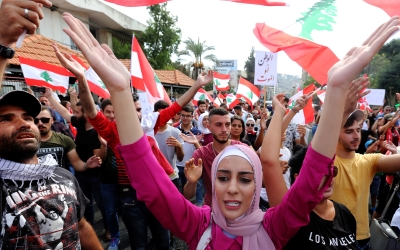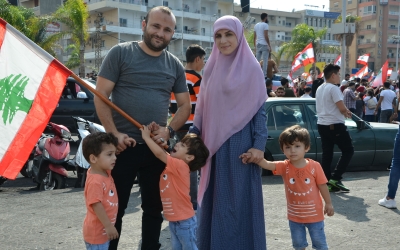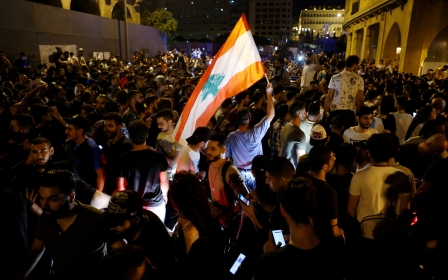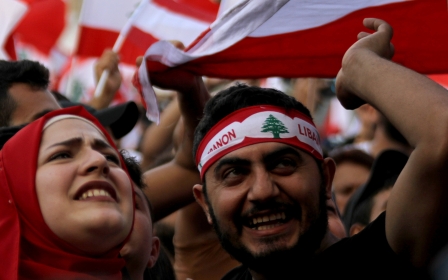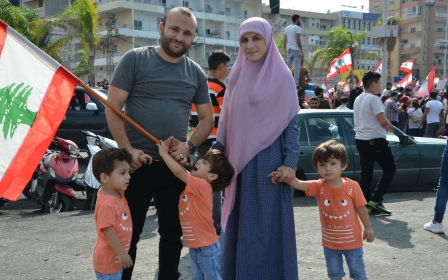Army and protesters face off over roadblocks as Lebanon continues to boil
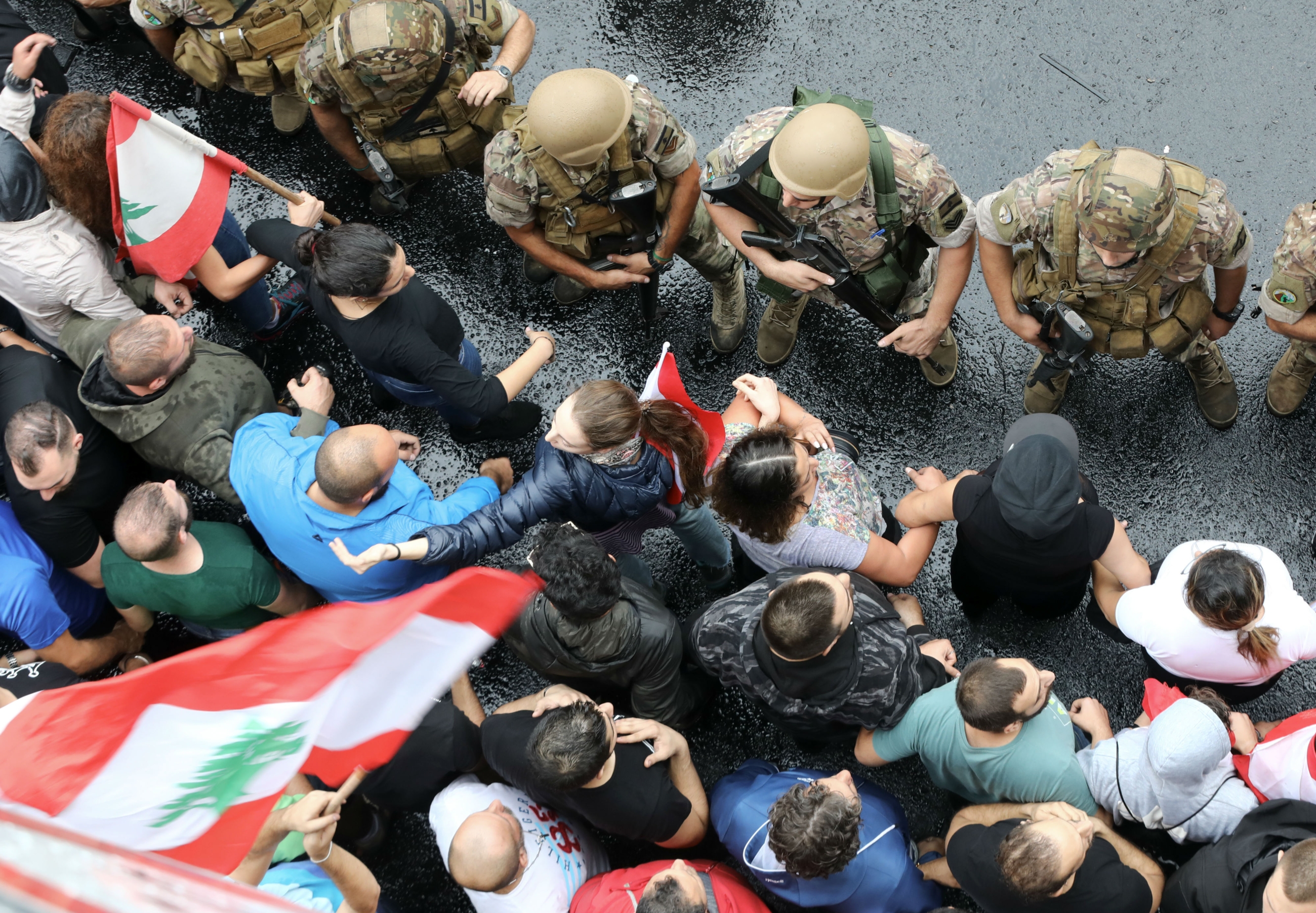
Lebanese protesters and the army clashed on major roads and highways across the country on Wednesday, as demonstrations raged for a seventh day over the dire economic situation.
Lina, a protestor blocking the main street by Lebanon’s Central Bank in the Hamra district told Middle East Eye the action is directed at the government.
“We want people who are still going to work to know that we are all going through a serious crisis and we need their support,” she said.
Since the earliest days of the protests, roadblocks have been set up to prevent regular economic activity and push for a general strike.
The seventh day of protests marked a larger-scale and systematic effort from the Lebanese Army and Internal Security Forces to clear roads.
On Monday Prime Minister Saad Hariri met with the head of the Lebanese army General Joseph Aoun, asking him to protect the right to protest, while also opening roads for “people’s freedom of movement, health services, and livelihoods”.
A tug-of-war has ensued between protesters and the army on the Jal el-Dib bridge and highway, north of Beirut.
Protesters said that they were beaten and pushed by the army. A video from the scene showed one soldier with tears in his eyes while complying with orders. Another video showed a protester with blood trickling down his face.
The Jal el-Dib bridge and highway, which is a major route from Lebanon’s north to the capital, has been packed with crowds and tents in recent days.
Kataeb Party leader and MP Samy Gemayel joined protesters, though many booed and called for him to leave.
Calls to resign
Further north, in Zouk Mosbeh, Lebanese television station LBCI was banned from filming the standoff between protesters and security forces.
A video of an attempted Al-Jadeed television broadcast showed protesters forcefully removed, and a woman’s phone confiscated by the army.
Free Patriotic Movement MP Neemat Frem tried to calm the situation. Speaking to demonstrators while standing on a vehicle, he told them that the country can’t afford to “collapse”.
“I came to say that I’m with you,” Frem said. “But yelling won’t lead to anything.”
The crowd booed Frem, and called for his resignation. “If I were a minister, I would have resigned,” he said.
In the southern city of Sidon, the army beat and briefly detained protesters a few hours after a crowd had gathered.
Azza, a resident and media researcher who wished to be identified only by her first name, told MEE that one of her relatives was arrested and released soon after.
A video shared by Amnesty International’s Rand Hammoud showed soldiers and intelligence officers beating and detaining protesters.
State-run National News Agency reported that several demonstrators were wounded and rushed to the hospital. Numbers of wounded have not yet been confirmed.
In the south, protesters in the city of Nabatieh got into a violent scuffle with partisans allegedly belonging to Amal and Hezbollah. Protestors called for blood donations at hospitals for the wounded.
Activist media group Akhbar al-Saha reported that the protestors were surrounded by Hezbollah and Amal members, the former chanting "We heed your call, Nasrallah."
Traditional media has not been present in the city. A livestreamed Facebeook video showed men, some carrying objects, attacking and forcefully removing protestors. Some have accused them of being Hezbollah, while activists told MEE these people are from the municipality, which is dominated by Amal.
'The country cannot bear remaining suspended and we fear a vacuum and nothing else'
- Nabih Berri, parliament speaker
Another video of the incident showed the scuffle, while protestors chanted "peaceful".
Hours after the fighting took place, media were allowed to enter the southern town. A protester told the Lebanese news channel Al Jadeed that Hezbollah and Amal attacked them "under the lid" of the municipality.
"Shame on you," he said. "It was one brother attacking another."
"We would have expected people from the elected parties to be busy working on coming up with economic solutions for the country... not to try and find ways to separate a peaceful revolution," a young woman told Al Jadeed, telling them to "not worry about your people being agents [with foreign agendas]".
"We will never be agents - but you should look for the agents among you."
Another man held his phone, smashed and bent, telling the reporter that the partisans broke their phones too.
"There is no doubt this was an organized decision - but it was idiotic," another protestor added. "These [protestors] are against the whole regime... they are the most honourable."
People across Lebanon have been protesting and shutting down businesses, schools and roads, calling for the resignation of Hariri and his government over the country’s dire economic situation and corrupt, ineffectual politics.
Lebanon is one of the most indebted countries in the world, and has been scrambling to unlock $11 billion in pledged soft loans and grants from the international community through a series of structural and economic reforms.
Four ministers belonging to the Lebanese Forces party resigned on Sunday. The following day, Hariri presented an emergency economic reform plan that the government promised to implement throughout the next year.
The plan includes reaching a near-zero deficit by the end of 2020, slashing current and former official salaries in half, and privatising the telecoms sector.
Despite the government’s promises, protesters remain adamant that the government resigns, and early parliamentary elections take place.
Mikati scandal
Meanwhile, President Michel Aoun has remained tight-lipped about the whole matter. Following a meeting with Hariri on Monday, he said that he sympathises with the protesters and their demands, but says their accusations that all officials are corrupt are “an injustice”.
Parliament Speaker Nabih Berri was quoted by local media as saying: "The country cannot bear remaining suspended and we fear a vacuum and nothing else."
Despite popular opinion rejecting all politicians as corrupt and ineffectual, some like former prime minister Najib Mikati have voiced their support for the demonstrations.
However Mikati, who is a multibillionaire, found himself in the middle of a corruption scandal on Wednesday, as the Tripoli MP was charged with having made illegitimate gains through a housing loan, along with his son Maher, brother Taha and Bank Audi.
His spokesperson denied the accusations.
Speaking to the press, the former prime minister said the prosecutor’s charge was a “message” sent to him for not supporting Aoun’s presidency.
“Get your hands out of the judiciary, out of the army,” he said in a message directed at Hariri and the government, accusing the judiciary of being politicised.
“I call on the minister of justice to save the era [of this government] and depoliticise the judiciary.”
Middle East Eye delivers independent and unrivalled coverage and analysis of the Middle East, North Africa and beyond. To learn more about republishing this content and the associated fees, please fill out this form. More about MEE can be found here.



